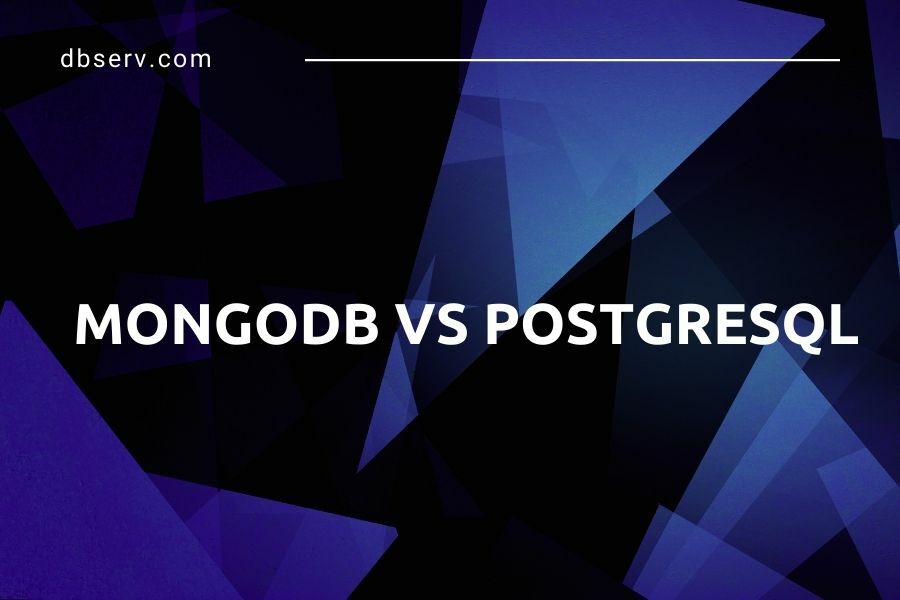Working with data requires reliable tools, databases, and systems to manage these databases. According to a Stack Overflow survey, 43.59% of respondents use PostgreSQL for working with structured data. Meanwhile, 28.3% prefer MongoDB when dealing with unstructured information. Both technologies have strong communities, but users who are not well-prepared may find it unclear when and how to use each.
DB Serv experts conducted a comparative analysis of MongoDB vs. PostgreSQL and are ready to present the results. By studying the article, you will learn the key features, differences, and purposes of these databases.
Setting the stage for MongoDB and PostgreSQL comparison
Initially, MongoDB was considered a NoSQL database, meaning it easily scales and stores data in flexible systems. In the SQL database, all information is placed in tables with predefined columns, as seen in the example of the Postgres DBMS. However, both options have undergone changes recently and are becoming more similar.
For example, MongoDB developers recently added ACID transactions and extended capabilities for query processing. Previously, these features were characteristic only of traditional SQL databases.
PostgreSQL, in turn, enhances its capabilities to work with the JSON format, predominantly used in NoSQL systems. It also introduces query optimization and indexing. Therefore, the lines between MongoDB and PostgreSQL are no longer so clear, and many are asking: what is better to use for business?
Understanding MongoDB
MongoDB is a document-oriented database that stores information in the form of JSON-like documents in collections with nested fields and arrays. It is open-source and designed to work with unstructured and semi-structured data.
MongoDB stands out for its fast task execution, high security, and virtually unlimited scalability. Let’s also consider other important characteristics of the database.
MongoDB’s Key Features
➡️ Characterized as a document-oriented model.
➡️ Supports the BSON (Binary JSON) data interchange format.
➡️ Provides encryption through TLS and SSL (Transport Layer Security and Secure Sockets Layer).
➡️ Compatible with Microsoft Azure, Google Cloud Platform, and Amazon Web Services (AWS).
➡️ Has a distributed architecture, ensuring the operation of components on multiple platforms.
➡️ Offers data replication to minimize potential failures.
➡️ Provides load balancing during scaling for uninterrupted operation.
PostgreSQL in Detail
PostgreSQL is a free and open-source object-relational database management system (ORDBMS). Data is stored in tables with predefined columns, rows, and types. Relationships between different tables are formed using foreign keys.
Postgres is characterized as a resilient, reliable, and highly stable system. Let’s explore its key features in more detail.
Key Features of PostgreSQL
- ➡️ Operates on traditional SQL syntax and database schema.
- ➡️ Compatible with popular operating systems, including Windows, Linux, Solaris, and OS X.
- ➡️ Supports various data types: JSON, hstore, geometric kinds, etc.
- ➡️ Adheres to ACID principles (Atomicity, Consistency, Isolation, Durability) when processing transactions.
- ➡️ Features streaming, logical, and synchronous replication for enhanced data protection during failures.
- ➡️ Offers security features: SSL encryption, Kerberos username and password authentication, row-level security (RLS), and role-based access control (RBAC).
- ➡️ Uses multi-version concurrency control (MVCC) to maintain data integrity.
Technical Comparison
We have highlighted the key aspects and characteristics for a more detailed MongoDB vs. Postgres comparison.
Data Model Differences
MongoDB employs a document-oriented model, primarily working with information in the form of JSON documents. Users can work with both unstructured and semi-structured data.
PostgreSQL utilizes a structured data model and SQL for interaction, storing data in tables interconnected with foreign keys.
Handling JSON: MongoDB vs PostgreSQL
Both products work with JSON. MongoDB uses its binary BSON format, while Postgres uses the binary extension JSONB. Both excel at the primary task of electronic exchange of digital data, storage, and query processing.
Performance Evaluation: MongoDB vs PostgreSQL
Evaluating the performance of both solutions is challenging due to their different approaches to data extraction and storage. However, there are important differences:
✅ MongoDB provides denormalized data, ensuring fast operation without the need to establish relationships between tables, which also enhances performance.
- ✅ Postgres handles complex queries more efficiently because it uses SQL and offers query optimizers, improving performance.
Reliability Comparison
PostgreSQL works with various data types and provides storage for large objects, offering features like anticipatory log writing, regular backups, and recovery in case of failure.
MongoDB, previously considered less secure, now supports ACID transactions through its WiredTiger data storage mechanism, increasing its reliability. MongoDB also provides a replica set, allowing for automatic failover to other resources, a feature available in PostgreSQL only by installing a third-party solution like pg_auto_failover.
Scalability Level
Comparing MongoDB vs PostgreSQL, it’s important to consider scalability capabilities. Both solutions have a load balancer to evenly distribute read queries, ensuring stable operation and high scalability.
MongoDB, however, excels in scalability, particularly at the corporate level, making it a preferred choice for large corporations. Horizontal scaling is a characteristic feature, providing a foundation for platforms with linear scalability when handling large datasets.
PostgreSQL also offers horizontal scaling and partitioning to break down large tables into smaller variations, simplifying management and ongoing operations.
Usability and Learning Curve
When comparing usability, it’s essential to consider the languages used by both products. For MongoDB, this is the MongoDB Query Language (MQL), whose syntax is similar to JSON. Therefore, developers familiar with JSON find data extraction and manipulation more convenient.
PostgreSQL uses SQL as its query language, which is relatively easy to learn. This makes the database accessible to both experts and novice specialists.
Thanks to its open-source nature, MongoDB has a broad support community that generates numerous improvements and a reliable ecosystem. Additionally, the database has extensive documentation with instructions and troubleshooting information. MongoDB also offers free online courses with training and certification.
PostgreSQL also comes with open-source code and is supported by the IT community. This ensures assistance from experienced professionals on forums and regular updates. Both third-party developers and enthusiasts, as well as the official founders of the product, contribute to the improvement and release of new features.
Making Your Decision
When deciding the MongoDB vs PostgreSQL debate, it’s important to realize that:
- ➡️ PostgreSQL is considered a more versatile database built on a relational model. It uses SQL as its query language and offers many features to enhance scalability, security, and performance. PostgreSQL is community-supported and continually receives updates for improvement.
- ➡️ MongoDB is built on a document model, providing built-in scalability, high availability, and simplified migration between multiple platforms or clouds. The solution has a strong community and offers free courses for beginners.
MongoDB is a better choice if your company needs a multi-cloud database that works uniformly across different environments. It guarantees data storage grouped by specific parameters and supports advanced serverless and mobile development technologies.
If your enterprise requires executing complex and voluminous queries, the best solution is the relational database PostgreSQL. It works with various third-party applications, simplifying its usage in corporate infrastructure.
Both products are widely used in the development of digital projects. Therefore, if your goal is to create a reliable application based on data processing, consider the following:
✅ PostgreSQL is suitable for applications with complex business logic that deal with a large amount of data. MongoDB is often used for applications processing web data and having a simple model for working with information.
✅ Choose a data management tool based on your specific case to realize the full potential of either database.
Which Database to Choose: MongoDB or PostgreSQL?
When comparing MongoDB vs PostgreSQL, let’s examine specific use cases for both options:
- ➡️ MongoDB: Applied for content management, processing product data, customer analytics, business transactions, and more. Additionally, the database is often used in the development of mobile applications that require increased scalability to serve a large number of users.
- ➡️ PostgreSQL: Well-suited for conducting business analysis, developing and supporting business apps, risk assessment, and industries where it’s crucial to store data from multiple sources. For example, in banking, healthcare, manufacturing, scientific data, and others.
Which solution is right for your business? The answer depends not only on the characteristics of a specific digital product but also on your situation. Consider the following factors when making a decision:
- ● The industry’s focus.
- ● Business tasks the database needs to address.
- ● Goals you want to achieve with the tools.
- ● Features of your company’s infrastructure.
- ● Volume and type of data to work with.
- ● The need for scalability and performance enhancement.
- ● Technical capabilities to maintain stable operation.
Final Thoughts
A comparative analysis of MongoDB vs. PostgreSQL has shown that both solutions offer a respectable level of security and scalability. Their performance is also sufficiently high but depends on the type and volume of data. MongoDB is designed for processing unstructured and semi-structured data, while PostgreSQL is tailored for structured data.
Looking for the ideal database for your business? Turn to the consultants at DB Serv. Our team can help with selection, implementation, and technical support.

